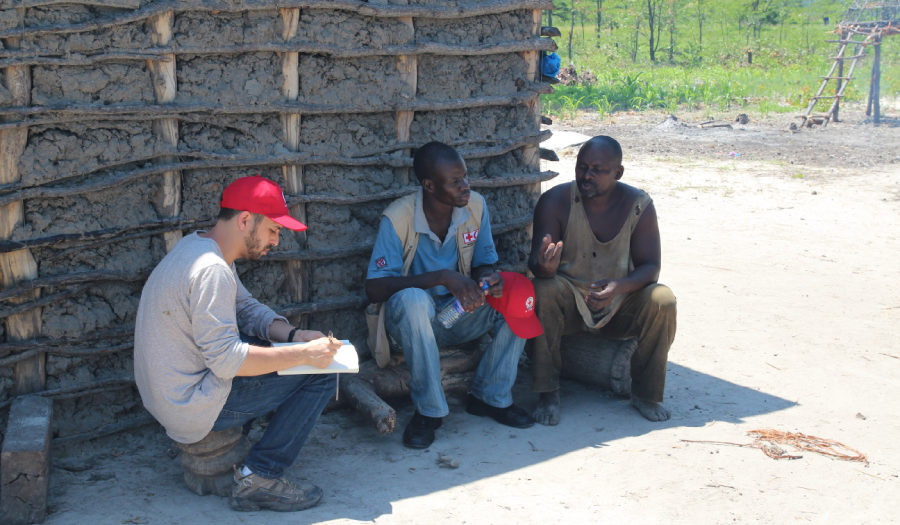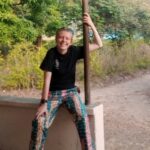IDCE’s pivots create enrollment success

For Libby Glabe, March 16, 2020 was just an ordinary Monday morning. The Peace Corps volunteer from Sister Bay, Wisconsin, was teaching biology and chemistry at the Yengema Secondary School in the Kono District of Sierra Leone.
Then, her world was turned upside down. She was notified she would have to leave her post immediately — the Peace Corps was recalling all volunteers back to the U.S. because of the pandemic. Within 24 hours, she had started her journey home, and had no idea what she would do next.
“I joined a Facebook group centered around the large-scale community of Returned Peace Corps Volunteers (RPCVs). It provided information and resources to evacuees for what would come next. That’s where I learned about Clark, its master’s programs, and the flexibility,” says Glabe. By the end of April, she had been accepted as a master’s student in international development, with a concentration in health equity.
As news of the Peace Corps volunteer recall spread, Director Ed Carr and his colleagues in Clark’s International Development, Community, and Environment Department (IDCE) reached out to RPCVs around the world and invited them to apply to IDCE programs with special accommodations, including a streamlined application process, enhanced financial aid, and flexibility built into the academic calendar.
By pivoting on enrollment opportunities and adapting teaching modalities, IDCE was able to turn what could have been a disastrous recruiting cycle into a diverse, robust cohort for Spring 2021 and beyond.
“The response was tremendous — we more or less made up for our lost international student enrollments with RPCVs and other domestic students,” says Carr. “Students are really responding to the curriculum and our desire to use critical approaches to knowledge to change how we work in the world and bring about better outcomes, whether for the environment or the poorest and most vulnerable among us.”
The surge in enrollments has much to do with three factors, Carr notes. “First, we created a shorter, more coherent curriculum that allows any student, in any program, to learn cross-disciplinary communication and to leverage the programmatic strengths of many IDCE programs through their concentration. This is a really unique structure, and students are responding to it,” he says. “Second, we’ve carried on with our outreach to the Peace Corps and we continue to see a great deal of interest from RPCVs. Finally, the economy is very challenging, and we are likely enrolling some people who see this time as an opportunity to change careers or take a step forward in their career.”
Carr believes that international enrollment will increase as pandemic conditions subside and embassies and consulates begin scheduling visa interviews. IDCE has always done well with international students — bringing in exceptional students who often have extensive professional experience.

For Mulku Bangura, a Fulbright Scholar and Mandela Washington Fellow from Sierra Leone, IDCE provides the knowledge and skills he needs to help his country and advance his career. In his government work, Bangura noticed there was a huge disconnect between what was happening at the central government level and what trickled down to the communities.
“The system wasn’t working and not a single issue was being resolved,” he says. So, he decided he needed more experience in development, focusing on poverty and inequality, to help rebuild his nation — which has been ravaged by the Ebola virus and the COVID pandemic.
“I wanted to equip myself to be able to work in international development organizations, so I can be part of the decision-making process. With a degree from IDCE and Clark, I can have the opportunity to sit in a room where projects and plans geared toward reducing poverty are determined,” Bangura says.

Romain Kiragoulou, from Burkina Faso, West Africa, joined the international development program in fall 2020, when learning was fully remote. But it didn’t feel that way to him.
“Seriously, I can tell you that I didn’t feel like I was like doing an online program because they were always communicating with me. Anytime I sent an email I received a response within a few minutes,” Kiragoulou says. “During class, some professors would take time to talk to us, to support us emotionally and psychologically, and tell us everything would be okay. This is something I had never seen.”
Students praise the support from faculty and staff, which helped eased the strain of pandemic restrictions. “The IDCE department is really focused on helping students. The courses are flexible and the staff encourages students to make choices — they make an intentional effort to present students with the opportunity to choose what they want and how they design their coursework,” says Bangura.
Bangura singles out Professor Jude Fernando, who assisted him when there was an issue with his stipend by providing food and helping him secure an internship to make up the financial shortfall. He adds that the staff has worked hard to replace hands-on fieldwork and trips that are not currently available due to COVID protocols, and believes that the quality of teaching has not changed.
“The faculty are doing a fantastic job keeping us connected with video conferencing to alumni and people in the field, who can describe their work and how what was taught at Clark resonated for them, and how they applied what they learned to their current work. It’s amazing and empowering,” Bangura says.

When he was evacuated last March, James Rider, a Peace Corps volunteer working in Peru, began searching for meaningful next steps. The job market in his field of international education programs was nonexistent.
“I was living in a crowded house with my Mom, Dad, and uncle. It wasn’t a good feeling as a 26 year-old,” he says. “I started researching graduate programs and saw that Clark University had a generous Coverdell scholarship for evacuees. After reaching out to a few professors and learning about the program, I knew it was the right fit. When I was offered a full tuition scholarship from the IDCE department, I was thrilled!”
Rider is currently in the international development program with a concentration in refugees, forced migration, and belonging.
Rider’s view of the pandemic is instructive. Fancying himself a vagabond, he never thought of staying in one place or going to graduate school — but the pandemic changed all that. “The pandemic has shown me the value of staying in one place and being near family. I can see how much international work can be done at a local level, and have been working as an immigration rights organizer to try to change state and federal immigration laws. I can see myself working domestically to work toward change that has a global impact,” he says.
For Kiragoulou, the pandemic has taught him that nothing is static; everything can change. “I see the importance of strategic planning — you need to be flexible,” he says. “We need to work together to make sure we can overcome difficulties like the pandemic, which has affected every country. I know I need more people around me, more connections. I should not rely on just what I know; I also need to go out of my comfort zone to learn more about what is going on in the world.”
Kiragoulou feels his views are important and valued at IDCE. He is eager to take the knowledge, experience, and expertise he has learned and go back to his own country to help. “I see us as sort of ambassadors of IDCE — we’re going back into the world with the knowledge IDCE has given us, and we’ll use it to help the world.”
Carr notes that, thanks to the resilience and adaptability of the students, the transition to remote learning went remarkably well. IDCE faculty were able to use the challenges of the pandemic as an opportunity to develop students’ professional skills by encouraging them to work in teams. Many faculty shifted classes and assignments to encourage the development of teamwork skills in remote settings, taking a perceived hardship and turning it into a virtue.

Glabe believes the adaptations have increased the effectiveness of the programs. “I think that IDCE’s programs put emphasis on the need to dramatically reframe how we even see problems and potential solutions. My hope is that IDCE, and the students here in the future, will continue to find new ways to see, understand, and carry out development.”


